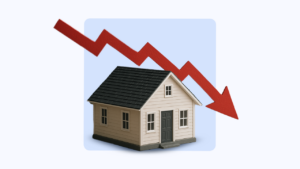Which states have the richest (and not-so-rich) homeowners?

Many homeowners are celebrating the recent boom in housing wealth, but not everyone is taking part in the home equity party.
Collectively, American homeowners have amassed almost $35 billion of home equity, a near-record amount. According to property fintech platform Cotality, that adds up to about $303,000 in equity for the average mortgage-holding homeowner, as of the end of 2024. It’s down slightly from $311,000, the historical peak reached in the third quarter of 2024.
“There’s been a little bit of stalling and declines in some areas, but overall, we are still looking at some of the highest levels of equity we’ve had historically,” says Selma Hepp, chief economist at Cotality.
Which states and cities have the wealthiest homeowners? What’s driving their prosperity? And which homeowners aren’t benefiting from the equity boom? Let’s dive into the details of how homeowner wealth is shaping up throughout the country.
Source: Board of Governors of the Federal Reserve System (US) via FRED
Which states have the biggest equity gains?
A majority (61 percent) of homeowners with mortgaged properties saw their equity increase by about $4,100 between the fourth quarter of 2023 and the fourth quarter of 2024, according to Cotality. However, that’s less than the $6,000 YoY gain in the third quarter. Home prices are still climbing, but at a more subdued pace.
“Over the course of last year, the Northeast and part of New England were the areas with the strongest home price appreciation,” says Hepp. “As a result of that, you’ll see New Jersey, Connecticut and Massachusetts having the largest [equity] increases of close to or about $35,000 to $40,000.”
The top five states for equity gains year-over-year are:
- New Jersey ($39,400)
- Connecticut ($36,300)
- Massachusetts ($34,400)
- Rhode Island ($33,000)
- Maine ($30,000)
Other regional areas of expanding equity include the upper Midwest, along with California and Nevada.
Which states have the most equity-rich homeowners?
If you’re equity-rich, your mortgage loan balance is no more than half the estimated market value of your home. You own more than you owe, in other words. According to ATTOM Data Solutions, 47.7 percent of the homes in the U.S. fall into that category in the fourth quarter of 2024.
Where specifically to find this valuable real estate? Go east, young homeowner: With one exception, the northeastern part of the U.S. is where home equity levels are highest.
The top five home-equity rich states are:
- Vermont (86.7 percent)
- New Hampshire (61.4 percent)
- Maine (61.1 percent)
- Rhode Island (60.8 percent)
- Montana (60.1 percent)
Nationwide, the percentage of equity-rich homes is down a bit: Back in Q2 2024, it peaked at close to half (49.2 percent). Still, ATTOM CEO Ron Barber confirms that equity growth remains strong. “It’s important to keep the broader picture in mind,” he says. “Both the total number and percentage of equity-rich homes have been steadily increasing for years. The slight Q4 dip came on the heels of two particularly strong quarters and does not necessarily indicate a reversal of the long-term trend.”
Where are homeowners in trouble?
However, not all homeowners are reaping the benefits of bigger equity stakes. In some states, like Iowa and New Mexico, appreciation has been virtually flat. And in others, home values have actually depreciated.
According to Cotality, the states with the biggest declines in home equity year-over-year are:
| State | Equity loss |
|---|---|
| Hawaii | -$28,700 |
| Florida | -$18,000 |
| Washington D.C. | -$15,000 |
| Texas | -$10,000 |
| Louisiana | -$ 7,000 |
You can attribute Hawaii’s losses to the Maui fires, which Hepp says devastated properties and their worth. “That does happen to equity when you have a natural disaster, especially if that equity is not protected, for example, by property insurance.” Florida homeowners were impacted by weakening prices in select areas like Cape Coral, Sarasota and Tampa, though Hepp notes that, “despite the decline, homeowner equity in Florida is actually very large. On average, homeowners have about $320,000 in equity.”
As for the Washington D.C., Hepp points out that the drop has nothing to do with the recent government layoffs. “The area lagged in terms of home price appreciation, and there was actually a slight decline following the surge in mortgage rates, because there were not a lot of people going into the offices,” she says. “This is just the D.C. area. It’s not the greater Washington metro area in Maryland and Virginia, which actually saw increases in equity.”
Rise in negative equity
Increases aren’t the case everywhere, though. While some homeowners are swimming in home equity, others are underwater.
According to Cotality data, the total number of residential properties with negative equity increased to 2 percent of all mortgaged properties in Q4 2024. That adds up to 1.1 million homes, the highest level since the first half of 2023.
In real estate lingo, “negative equity” or being underwater occurs when the mortgage balance (and/or other home-based debt) on a home is greater than its market value. In other words, its possessor owes more than the home is worth.
According to Cotalilty, the states with the biggest percentages of negative equity are:
| State | % of properties |
|---|---|
| Louisiana | 6.17% |
| Iowa | 5.24% |
| Oklahoma | 4.53% |
| Mississippi | 4.27% |
| Kentucky | 3.56% |
| North Dakota | 3.53% |
And according to ATTOM, the states with states that are most seriously underwater (when the amount owed on the home loan exceeds the current market value of the property by at least 25 percent) are:
| State | % of properties |
|---|---|
| Louisiana | 9.5% |
| Mississippi | 6.4% |
| Kentucky | 6.1% |
| Arkansas | 5.3% |
| Iowa | 5.3% |
“When you look at what those markets are all about, these are generally lower income markets, lower down payment, and historically a lower rate of home price appreciation,” says Hepp. “You also tend to see more natural hazards in these areas.”
While 1.1 million underwater homes sounds like a lot, consider some historical context: 12 million homes were underwater during the Great Recession, peaking at 26 percent of mortgaged residential properties. “Currently, we only have about 2 percent of homeowners nationally in negative equity,” says Hepp.
Even if the economy slows significantly, a recession’s impact on the housing market could be profoundly different than it was 15 years ago, thanks to the large size of equity stakes. “This time around, existing homeowners are in a much better position with that financial buffer than they were coming out of the financial crisis,” Hepp adds.
Where homeownership hurts the most
While homeowners are enjoying high equity levels, they also are facing higher home-related expenses. Bankrate’s Hidden Cost of Homeownership study found that the average annual cost of owning and maintaining a single-family home has jumped 26 percent in the past four years, to $18,118 annually. Everything has gotten more expensive, from property taxes to homeowners insurance to goods and services, driven by inflation in general and rising values in particular (in some cases).
Not surprisingly, the places with the big gains often feel the most pain: “Homeowners [who] are benefiting from the best equity [are] in the most expensive markets around the country, which have the highest ownership costs,” says Barber. Several of the top states for equity gains pay more than $25,000 yearly in ownership and maintenance costs. They have experienced the biggest increases, too, the Bankrate survey found.
Of homeowners who have at least one regret about buying their current home, 40 percent cite higher maintenance and other hidden costs as the most common reason.
“Existing homeowners have benefited from the rise in home prices and that resulted in accumulation of equity, but that has been to the detriment of newer entrants to the housing market,” says Hepp. “As a result of these increases in home prices, [home] affordability is at some of the lowest levels we’ve had historically.”
Why is home equity significant?
Home equity represents wealth.
“The growing equity from the long housing market boom has delivered significant benefits for homeowners across all income levels,” says Barber. “As equity increases, so does the value of what is often a household’s number one asset, enhancing overall net worth and boosting potential profits when it comes time to sell, with no notable downsides.”
Even before they sell, homeowners can utilize their equity stake: borrowing against it with a HELOC or home equity loan to improve their property, pay for their kids’ college or consolidate debt, at interest rates that are among the lowest for consumer debt. Or, homeowners can hang onto their equity by staying put in their homes and pass it down to future generations.
More than four in five respondents (82%) regard their home equity as important to their overall financial stability, a recent TD Bank survey of over 5,000 American adults found. Additionally, over two-thirds (68%) view homeownership primarily as an investment to build equity.
What could throw a monkey wrench in the growth of home equity is a potential slowdown in the U.S. economy. “Historically, economic downturns have weakened housing markets as rising unemployment and reduced consumer confidence lead fewer families to invest in homeownership,” says Barber. “As demand softens, home values may decline, pushing more properties into underwater territory, where homeowners owe more than their homes are worth. At the same time, the share of equity-rich properties could shrink as falling prices erode accumulated equity. While the effects vary by recession, past trends suggest a shift in equity distribution is likely.”
Even if the economy and home value growth tapers off, though, building a decent equity stake can give homeowners a powerful financial advantage. Not only can it help cover major expenses, it can also be a valuable safety net for when times get tough.
Why we ask for feedback Your feedback helps us improve our content and services. It takes less than a minute to complete.
Your responses are anonymous and will only be used for improving our website.
You may also like

How much does it cost to sell a house?

Average closing costs on a house in 2025




